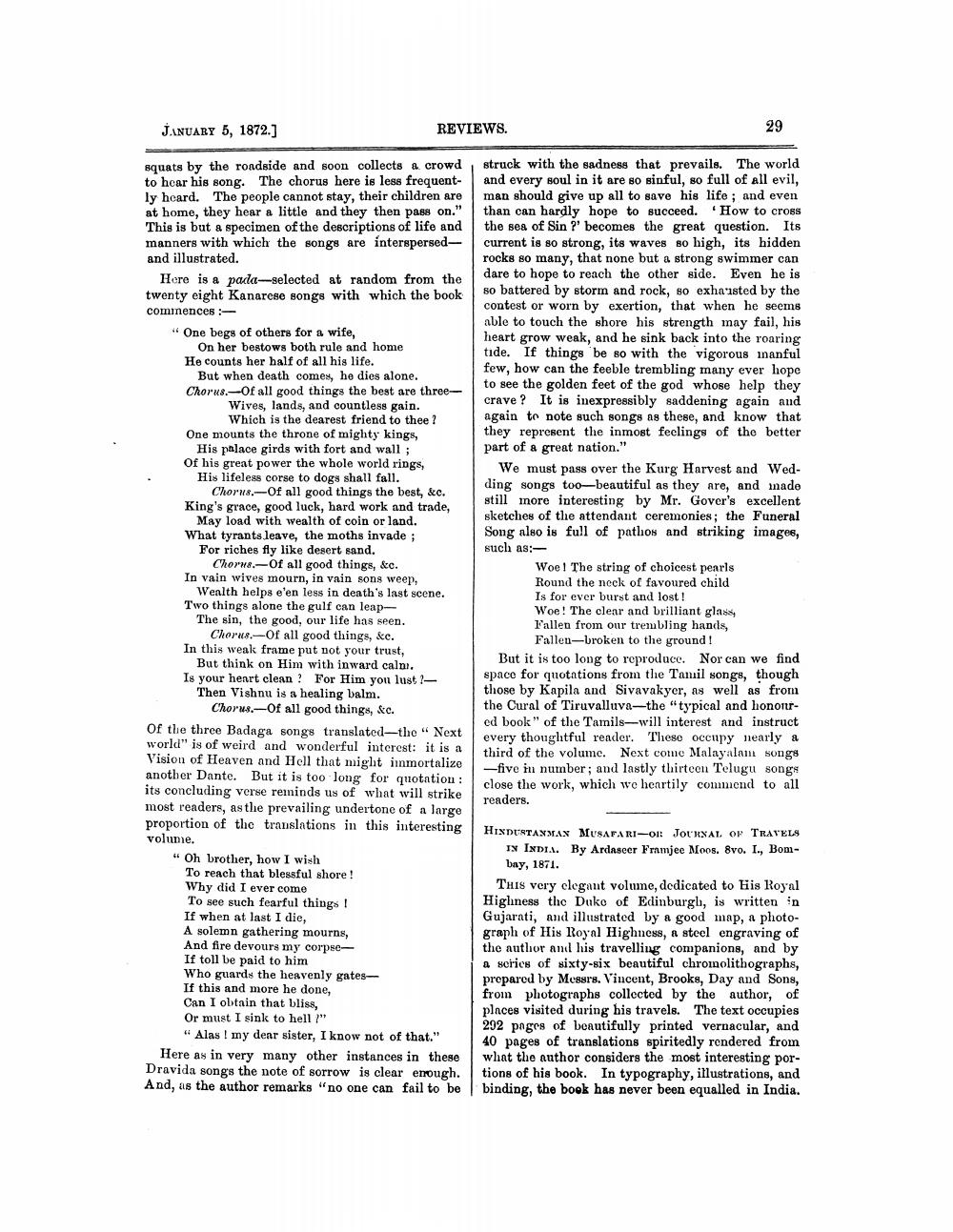________________
JANUARY 5, 1872.]
REVIEWS.
29
squats by the roadside and soon collects a crowd to hoar his song. The chorus here is less frequently heard. The people cannot stay, their children are at home, they hear a little and they then pass on." This is but a specimen of the descriptions of life and manners with which the songs are interspersedand illustrated.
Here is a pada-selected at random from the twenty eight Kanarese songs with which the book cominences :
One begs of others for a wife,
On her bestows both rule and home He counts her half of all his life.
But when death comes, he dies alone. Chorus.--Of all good things the best are three
Wives, lands, and countless gain.
Which is the dearest friend to thee? One mounts the throne of mighty kings,
His palace girds with fort and wall; Of his great power the whole world rings, His lifeless corse to dogs shall fall.
Chorus.-Of all good things the best, &c. King's grace, good luck, hard work and trade,
May load with wealth of coin or land. What tyrants leave, the moths invade; For riches fly like desert sand.
Choru-Of all good things, &c. In vain wives mourn, in vain sons weep,
Wenlth helps e'en less in death's last scene. Two things alone the gulf can leapThe sin, the good, our life has seen.
Chorus. Of all good things, &c. In this weak frame put not your trust,
But think on Him with inward calni. Is your henrt clean ? For Him you lust! Then Vishnu is a healing balm.
Chorus.-Of all good things, &c. Of the three Badaga songs translated-tho "Next world" is of weird and wonderful interest: it is a Vision of Heaven and Hell that might inmortalize another Dante. But it is too long for quotation : its concluding verse reminds us of what will strike most readers, as the prevailing undertone of a large proportion of the translations in this interesting volume.
"Oh brother, how I wish
To reach that blessful shore ! Why did I ever come
To see such fearful things! If when at last I die, A solemn gathering mourns, And fire devours my corpse If toll be paid to him Who guards the heavenly gatesIf this and more he done. Can I obtain that bliss, Or must I sink to hell ?"
" Alas I my dear sister, I know not of that." Here as in very many other instances in these Dravida songs the note of sorrow is clear errough. And, as the author remarks "no one can fail to be
struck with the sadness that prevails. The world and every soul in it are so sinful, so full of all evil, man should give up all to save his life; and even than can hardly hope to succeed. How to cross the sea of Sin ?' becomes the great question. Its current is so strong, its waves so high, its hidden rocks so many, that none but a strong swimmer can dare to hope to reach the other side. Even he is so battered by storm and rock, so exha isted by the contest or worn by exertion, that when he seems able to touch the shore his strength may fail, his heart grow weak, and he sink back into the roaring tide. If things be so with the vigorous inanful few, how can the feeble trembling many ever hope to see the golden feet of the god whose help they crave? It is inexpressibly saddening again and again to note such songs as these, and know that they represent the inmost feelings of the better part of a great nation."
We must pass over the Kurg Harvest and Wedding songs too-beautiful as they are, and inade still more interesting by Mr. Gover's excellent sketches of the attendant ceremonies; the Funeral Song also is full of pathos and striking images, such as:
Woe! The string of choicest pearls Round the neck of favoured child Is for ever burst and lost ! Woe! The clear and brilliant glas l'allen from our trembling hands,
Fallen-broken to the ground! But it is too long to reproduce. Nor can we find space for quotations from the Tamil songs, though those by Kapila and Sivavakyer, as well as from the Cural of Tiruvalluva--the "typical and hononed book" of the Tamils-will interest and instruct every thoughtful reader. These occupy nearly a third of the volume. Next come Malayalam songs -five in number; and lastly thirteen Telugu song close the work, which we heartily commend to all readers.
HINDUSTAXMAX MUSAFARI-01: JOURNAL OF TRAVELS
IN INDIA. By Ardaseer Framjee Moos. 8vo. I., Bombay, 1871. This very clegant volume, dedicated to tiis Royal Highness the Duko of Edinburgli, is written in Gujarati, and illustrated by a good map, a photograph of His Royal Highness, a steel engraving of the author and his travelling companions, and by a series of sixty-six beautiful chromolithographs, prepared by Messrs. Vincent, Brooks, Day and Sons, from photographs collected by the author, of places visited during his travels. The text occupies 292 pages of beautifully printed vernacular, and 40 pages of translations spiritedly rendered from what the author considers the most interesting portions of his book. In typography, illustrations, and binding, the book has never been equalled in India.




